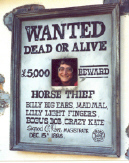 Gillian Polack is an Australian hsitorian and writer of fantasy. She is the author of the novel Life Through Cellophane, edited Masques (CSFG) and the new anthology for Eneit Press, Baggage, which contains stories from such luminaries as Kaaron Warren and Deborah Biancotti. She has written fantastic entries for one of the most useful books on my shelf, Lindahl’s Medieval Folklore: An Encyclopedia of Myths, Legends, Tales, Beliefs, and Customs. She’s also a medieval foodie and she bloggeth here.
Gillian Polack is an Australian hsitorian and writer of fantasy. She is the author of the novel Life Through Cellophane, edited Masques (CSFG) and the new anthology for Eneit Press, Baggage, which contains stories from such luminaries as Kaaron Warren and Deborah Biancotti. She has written fantastic entries for one of the most useful books on my shelf, Lindahl’s Medieval Folklore: An Encyclopedia of Myths, Legends, Tales, Beliefs, and Customs. She’s also a medieval foodie and she bloggeth here.
1. You recently edited the Baggage anthology for Eneit Press – how did that come about?
I thought it came about because I was involved in a discussion with my editor (of Life Through Cellophane) about my dream book, but it recently transpired that she set the whole thing up. In other words, Eneit Press wanted an anthology from me, because Sharyn rather thought I could do something she would want to publish. From my end, though, it went something like:
Sharyn Lilley: “What’s your dream anthology?”
Gillian Polack: “Cultural baggage, of course, Australian and very spec fic. Pushing boundaries. Giving writers nightmares.”
Sharyn Lilley: “Who are your dream writers?”
Gillian Polack: “In the real world, I’d have to think about it. In a perfect world, I’d start with Jack Dann and Janeen Webb and Lucy Sussex and KJ Bishop and Simon Brown and Maxine McArthur and Kaaron Warren and…”
Sharyn Lilley: “Write to them today. Just the first ones on the list, mind. You can write to the others later, if there’s space. Offer them a place in Eneit Press’s new anthology.”
Gillian Polack: “But I’m shy.”
Sharyn Lilley: “Don’t care. Write now. This minute.”
Those weren’t the exact words, but that was how it happened. I never even got to the rest of my list of dream writers, because the first list mostly said ‘yes.’ And their stories gave at least three of the writers nightmares. I thought I was sweetness and light and a gentle soul, but it seems not.
2. You get to be your favourite fictional character for a day with no consequences: who are you, where do you go and what do you do?
I am so torn. I want to be Belle from the Disney cartoon, simply so that I can own her library. I’d find the lost books of Livy there and spend my day reading them. Or I’d look up the books that have the unwritten Jewish history I’ve only seen hints of in stories.
I also want to be Aslan, so that I can fix up the Susan error and create my own world.
I want to be Emma in Emma Tupper’s Diary and to be non-meek and still inherit the Earth (why does she have to be so nice and so gentle, even under provocation?).
I want … to be a bunch of characters, not just those few. There are too many things to do and too many places to imagine. I think I’d better give up and become a writer.
3. You are forced to choose: editing or writing?
Writing, of course. With writing I still get to edit, but with editing it’s always the dreams of others. I hope I never have to choose, though, because the dreams of others are so very wonderful.
4. How much does your academic work feed into your fiction writing?
Who I am feeds into my fiction writing. The academic side of my brain shows in my fiction, if you look closely enough. I edit my own work so that you can pin it down to a precise time. No vaguely ‘contemporary’ for me, because I can see the history happening and I use it in my writing. If I set a novel in 2004 in Canberra, then there are going to be scars from the bushfires. Not just landscape scars, but in peoples’ minds. This is the historian in me, reminding the writer in me that place and time count. We’re not neutral about them.
On a more obvious note, I’m currently writing a novel mostly set in the Middle Ages, but with modern characters. That uses my academic self extensively. The trick is going to be not letting the historian take over and not overload the whole thing with footnotes and analysis.
There’s a third direction where my academic self feeds into my fiction self. Very little of my fiction is free from theses. I don’t always make them obvious, but they’re there. I’m always poking holes in someone’s ideas and prized thoughts with my fiction.
5. Donuts (or doughnuts) or danishes.
It depends on the recipe. It depends on the date of the recipe. If you added ‘the early 80s’ to your question, I’d say danishes for Australia and doughnuts for the US, for instance. I like both, though. Good ones. The sort you can’t eat more than once a year without losing a bit of your soul.


2 Responses to The Baggage Drive-by: Gillian Polack